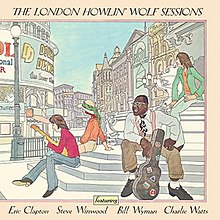The Concert for George was held at the Royal Albert Hall in London on 29 November 2002 as a memorial to George Harrison on the first anniversary of his death. The event was organised by Harrison's widow, Olivia, and his son, Dhani, and arranged under the musical direction of Eric Clapton. The profits from the event went to the Material World Charitable Foundation, an organisation founded by Harrison.

Ian Andrew Robert Stewart was a Scottish-born English keyboardist and co-founder of the Rolling Stones. He was removed from the lineup in May 1963 at the request of manager Andrew Loog Oldham who felt he did not fit the band's image. He remained as road manager and pianist for over two decades until his death, and was posthumously inducted into the Rock and Roll Hall of Fame along with the rest of the band in 1989.

Metamorphosis is the third compilation album of the Rolling Stones music released by former manager Allen Klein's ABKCO Records after the band's departure from Decca and Klein. Released in 1975, Metamorphosis centres on outtakes and alternate versions of well-known songs recorded from 1964 to 1970.
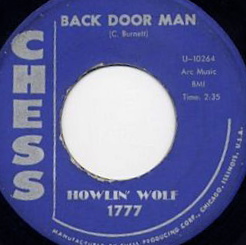
"Back Door Man" is a blues song written by American musician Willie Dixon and recorded by Howlin' Wolf in 1960. The lyrics draw on a Southern U.S. cultural term for an extramarital affair. The song is one of several Dixon-Wolf songs that became popular among rock musicians, including the Doors who recorded it for their 1967 self-titled debut album.
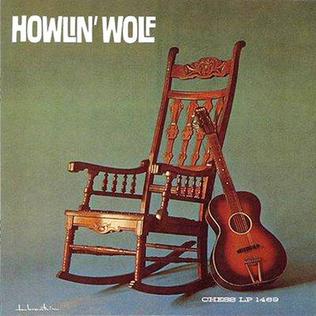
Howlin' Wolf is the second album from the Chicago blues singer/guitarist/harmonicist, Howlin' Wolf. It is a collection of twelve singles previously released by the Chess label from 1960 through 1962. Because of the illustration on its sleeve, the album is often called The Rockin' Chair Album, a nickname even added to the cover on some reissue pressings of the LP.
“Ventilator Blues” is a song by the English rock band the Rolling Stones that is included on their 1972 album Exile on Main St.

"Goin' Down Slow" or "Going Down Slow" is a blues song composed by American blues singer St. Louis Jimmy Oden. It is considered a blues standard and "one of the most famous blues of all".
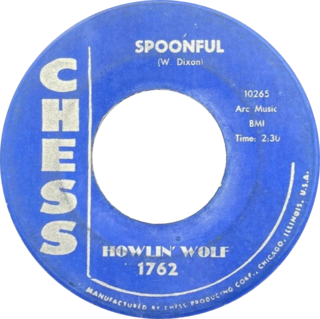
"Spoonful" is a blues song written by Willie Dixon and first recorded in 1960 by Howlin' Wolf. Called "a stark and haunting work", it is one of Dixon's best known and most interpreted songs. Etta James and Harvey Fuqua had a pop and R&B record chart hit with their duet cover of "Spoonful" in 1961, and it was popularized in the late 1960s by the British rock group Cream.
"Can't You Hear Me Knocking" is a track by English rock band the Rolling Stones from their 1971 album Sticky Fingers. The track is over seven minutes long, and begins with a Keith Richards open-G tuned guitar intro. The main song lasts for two minutes and 43 seconds, after which it transforms into an extended improvisational jam. The entire track was captured in one take, with the jam being a happy accident; the band had assumed the tape machine had been stopped, and were surprised to find the entire session had been captured. Originally they were going to end the song before the jam started, but were so pleased with the jam that they decided to keep it in. Besides the regular Rolling Stones members Mick Jagger (vocals), Keith Richards (guitar), Mick Taylor (guitar), Charlie Watts (drums) and Bill Wyman (bass), the track also features conga player Rocky Dijon, saxophonist Bobby Keys, organist Billy Preston and additional percussion by producer Jimmy Miller.
"Wang Dang Doodle" is a blues song written by Willie Dixon. Music critic Mike Rowe calls it a party song in an urban style with its massive, rolling, exciting beat. It was first recorded by Howlin' Wolf in 1960 and released by Chess Records in 1961. In 1965, Dixon and Leonard Chess persuaded Koko Taylor to record it for Checker Records, a Chess subsidiary. Taylor's rendition quickly became a hit, reaching number thirteen on the Billboard R&B chart and number 58 on the pop chart. "Wang Dang Doodle" became a blues standard and has been recorded by various artists. Taylor's version was added to the United States National Recording Registry in 2023.

Leon Russell is the debut solo album by the singer, songwriter, and multi-instrumentalist Leon Russell. It followed his debut with the Midnight String Quartet and a production by Russell and Marc Benno billed as the Asylum Choir.

"Little Red Rooster" is a blues standard credited to arranger and songwriter Willie Dixon. The song was first recorded in 1961 by American blues musician Howlin' Wolf in the Chicago blues style. His vocal and slide guitar playing are key elements of the song. It is rooted in the Delta blues tradition and the theme is derived from folklore. Musical antecedents to "Little Red Rooster" appear in earlier songs by blues artists Charlie Patton and Memphis Minnie.

I Am the Blues is the sixth studio Chicago blues album released in 1970 by the well-known bluesman Willie Dixon. It is also the title of Dixon's autobiography, edited by Don Snowden.
The All-Stars were a short-lived English blues combo active in the early-mid 1960s. Originally known as the Cyril Davies (R&B) All-Stars, their later recordings are often credited to the Immediate All-Stars due to their releases on Immediate Records. In 1999, the group reformed as the Carlo Little All-Stars.

Fathers and Sons is the seventh studio album by the American blues musician Muddy Waters, released as a double LP by Chess Records in August 1969.

His Best is a greatest hits album by American blues musician Howlin' Wolf. The album was originally released on April 8, 1997, by MCA/Chess Records, and was one of a series of releases by MCA for the 50th anniversary of Chess Records that year. Ten years later – on April 17, 2007 – the album was reissued by Geffen Records as The Definitive Collection.
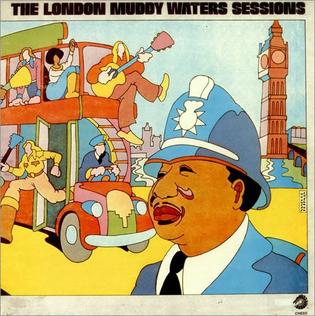
The London Muddy Waters Sessions is a studio album by Muddy Waters, released in 1972 on Chess Records. A follow-up to 1971's The London Howlin' Wolf Sessions, the concept was to combine American bluesmen with British blues/rock stars. The album was an attempt to capitalise on the increasing popularity of traditional blues music and blues artists in Britain.
Jeffrey M. Carp was an American blues harmonica player. He was best known for his work with Muddy Waters, John Lee Hooker, and Howlin' Wolf. He played harmonica on numerous charting blues albums. He was also for a period of time, a side man in Earl Hooker's band.

The Back Door Wolf is the final studio album by blues musician Howlin' Wolf, released by Chess Records in 1973.
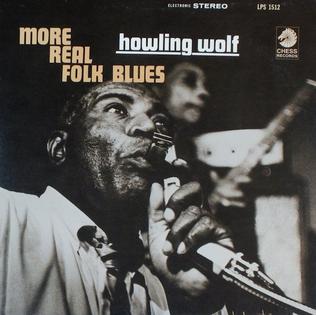
More Real Folk Blues is a compilation album by blues musician Howlin' Wolf, released by Chess Records in 1967. It includes songs that were recorded in Memphis and Chicago between 1953 and 1956.
